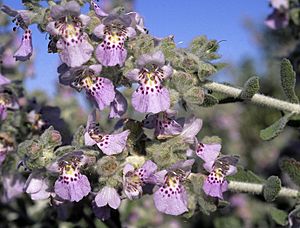Quoya (plant) facts for kids
Quick facts for kids Quoya (plant) |
|
|---|---|
 |
|
| Quoya atriplicina growing in Francois Peron National Park | |
| Scientific classification |
|
| Kingdom: | Plantae |
| Clade: | Tracheophytes |
| Clade: | Angiosperms |
| Clade: | Eudicots |
| Clade: | Asterids |
| Order: | Lamiales |
| Family: | Lamiaceae |
| Subfamily: | Prostantheroideae |
| Genus: | Quoya Gaudich. |
| Species | |
|
See text |
|
Quoya (say "KWOY-uh") is a group of flowering plants. These plants belong to the family called Lamiaceae, which also includes mint. All Quoya plants are found only in Western Australia, meaning they are endemic there.
Plants in the Quoya group are usually shrubs. Their flowers have five petals that are joined together, forming a tube shape. Each flower also has four stamens, which are the parts that make pollen. These stamens are not all the same length.
Contents
What are Quoya Plants Like?
Quoya plants are evergreen shrubs, meaning they keep their leaves all year round. They are often covered with soft, woolly hairs.
Leaves and Flowers
The leaves of Quoya plants are simple and grow in pairs opposite each other on the stem. They can be shaped like an egg or almost round. These leaves are also covered with tiny, branched hairs.
The flowers usually grow in small groups of 3 to 7. Sometimes, they form short spikes. Quoya flowers have a special kind of symmetry, meaning they look the same on the left and right sides.
Each flower has five sepals, which are like small leaves that protect the bud. These sepals are joined at their base, forming a short tube. Inside, there are five petals that form a straight or slightly curved tube. At the end of the petal tube, there are five small sections called lobes. The top lobes are shorter than the ones at the bottom.
Stamens and Fruit
Inside the flower, there are four stamens. The two lower stamens are not as good at making pollen. After the flower blooms, it produces a type of fruit called a drupe. A drupe is a fleshy fruit with a hard pit inside, like a peach or a cherry. The sepals stay attached to the fruit even after it forms.
How Quoya Got Its Name
The Quoya group of plants was first officially described in 1828 by a scientist named Charles Gaudichaud-Beaupré. He wrote about it in his book, Voyage Autour du Monde ... sur les Corvettes de S.M. l'Uranie et la Physicienne.
The first plant described in this group was Quoya cuneata. The name Quoya was chosen to honor Jean René Constant Quoy. He was a surgeon and zoologist, and a good friend of Gaudichaud-Beaupré.
Different Types of Quoya Plants
Here are some of the different species (types) of Quoya plants:
- Quoya atriplicina
- Quoya cuneata
- Quoya dilatata
- Quoya loxocarpa
- Quoya oldfieldii
- Quoya paniculata
- Quoya verbascina
Where Quoya Plants Live
All the different kinds of Quoya plants are found only in Western Australia. This means they are native to that area and do not grow naturally anywhere else in the world.
See also
 In Spanish: Quoya para niños
In Spanish: Quoya para niños
 | Percy Lavon Julian |
 | Katherine Johnson |
 | George Washington Carver |
 | Annie Easley |

